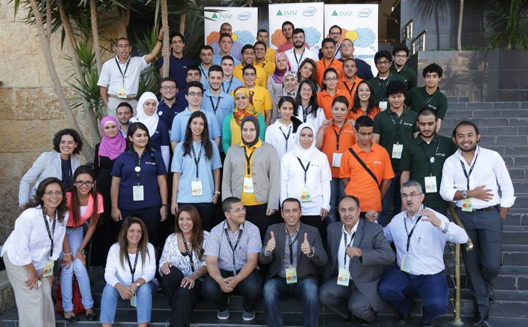Lebanon's Re-H2O team tackles water scarcity in the Arab world


At Intel and Injaz al-Arab's Sci-preneurship Innovation Camp this past July,
six young Lebanese students found an innovative, inexpensive way to
solve the major water shortage issue that affects the Arab world:
using air conditioners.
It may sound like an unlikely solution, but David Kors, Abed
Sherkawi, Radwan Othman, Omar Itani, Oudey Hamadeh, and Nisrine
Hammoud, all first year undergradute students, realized that the
distilled water that condenses inside air conditioners, which is
typically funneled off for refuse, could be collected and re-used.
“This water is completely safe to be used as tap water,” says
Hammoud, a business student at Balamand University.
After developing a prototype over 48 hours during the competition,
the six students debuted their final product, Re-H2O, to win. If
they were to take the product to market, "we would target the
Gulf, as it has the highest use of air conditioners,” says Hamadeh,
an international business student at the Lebanese American
University.
Addressing the region's water shortages was the challenge at the very first Sci-preneurship conference in the Arab World (the first Europeen Sci-preneurship competition was held in 2011) a joint effort by Intel, the technology company, and Injaz al-Arab, the organization that trains students to become entrepreneurs. With 5% percent of the world’s population, but less than 1% percent of global water resources, according to the UNDP, the Middle East and North Africa is one of the most water scarce regions on the planet. "The average Arab citizen has eight times less access to renewable water than the average global citizen, a UNDP report stated in November last year.
To empower young students to tackle this issue
with marketable solutions, Intel and Injaz partnered business
students with science students, ensuring that each team consisted
of three winners of the Intel International Science of
Engineering Fair (ISEF) and three alumni from Injaz's yearly
company program. Thirty-six students joined the
competition from six countries- Jordan, Egypt, Palestine, Lebanon,
Saudi Arabia and Morocco- to imagine a new future.
While the winnners have now all returned to finish their studies,
the six students say that they've learned skills that will help
them return to building businesses and solving social and
environmental issues once they graduated.
-
Team work. Having to work with strangers taught the team members to share ideas and listen to each other and trusting each others' skills. “It was very hard at first, as we didn’t know each other and we weren’t used to working together, but things got better later,” says Hammoud.
-
Working under pressure. Most of the students were in their first year in university, and did not yet experience short deadlines pressure (like delivering projects or essays in a short time).“We were on a tight deadline and determined to win, so we did our best,” says Hamadeh.
-
Problem solving. Being in this competition pushed the students to explore and test solutions for a global problem, inspired by small events from their daily lives. “I don’t really remember who or how we came up to discussing ACs, but we initially all thought of the small buckets filled with dripping AC water,” says Hammoud.
-
Inspired by a social need. Both Hammoud and Hamadeh affirmed that the competition inspired them to potentially work in a similar field after they graduate. “Being part of this competition pushed me to think out of the box and opened up my eyes to the importance of doing something about daily problems,” Hammoud describes.
If
the competition's goal was to instill a sense of concern over the
future and train a new generation to focus on global solutions, it
has succeeded. “Working on the Re-H2O project during the
competition made me realize how important it is to solve
environmental issues, and I am now motivated to work in this sector
whether part of a company, or building up my own startup,” says
Hamadeh.
Intel sponsored Wamda's Mix N' Mentor Roadshow
2013.


